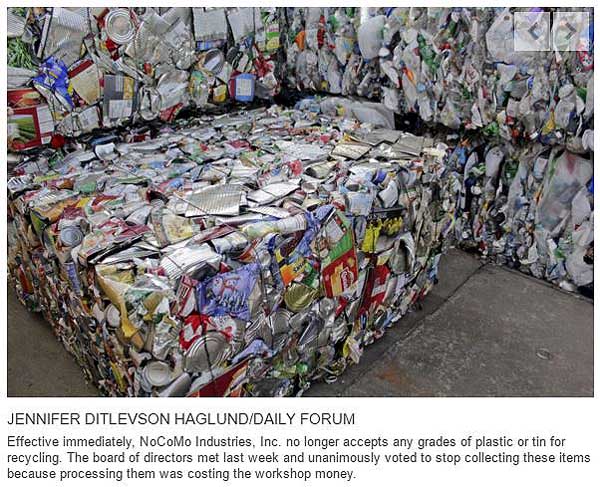Paper Only: Company Refuses to Recycle Any Other Product
![]() Print this Article | Send to Colleague
Print this Article | Send to Colleague
According to a report yesterday (March 30) by the Maryville Daily Forum, Maryville, Mo., USA, due to the increasing difficulty of finding sustainable means of disposal, NoComo Industries Inc., (Maryville) will no longer take any plastics or tin for recycling. The board of directors voted unanimously to discontinue collecting and sorting these items this past Tuesday after monitoring the recycling market for the past half year.
Nicki Samson, who is the GM of NoCoMo, made a surprisingly candid remark on the state of the non-paper based recycling industry when she said recycling tin and plastic never made money, but it was starting to actually cost money.
"We don’t need to make a lot of money, but we can’t lose money," Samson said.
According to Samson, ever since the Chinese government began more closely monitoring scrap imports in 2013 with the multi-agency effort called Operation Green Fence, it has been more difficult to handle recyclables. Selling plastic in the past two years has been particularly difficult.
"It’s getting hard to get rid of this stuff," Samson said. "Quite honestly, the market is saturated."
In 2013, China stopped taking shipments of plastic grades three, six, and seven. These grades include plastic packing materials, toys, costume jewelry, baby bottles, audio cassettes, and disposable coffee lids.
"No one has the time or manpower to sort through all of it and still make money," said Samson. "There are so many grades of plastic, and there are grades within those grades."
For the most part, she said, businesses that process recyclable plastics are looking for grades one and two. But combined with the Chinese decision on plastic grade recycling, there is another with the more desirable grades: hardly enough of it is being produced anymore through the use of discarded plastic from particular types of bottles. Paper based sustainable packaging may have taken them out of the common recycling route by replacing them on the shelves of their original point of purchase, and with them, the incentive for handling other plastics as well.

Although NoCoMo is limiting the number of items they will take, Samson said the operation is still growing as it becomes a paper exclusive recycler, and it continues to serve a variety of local businesses.
"The community has been very good with supporting us," Samson said.
NoCoMo is a nonprofit workshop regulated by the Missouri Department of Elementary and Secondary Education that provides employment for people with developmental and cognitive disabilities. Certified employees work year-round building custom wood pallets, recycling, and packaging. Samson said no one of these three branches of NoCoMo’s services is more important than the other. Throughout the year, focus on one area fluctuates, according to season.
"Everything we do here is essential to giving somebody dignified employment," said Samson.
The recycling program will still accept aluminum, but primarily paper products such as unwanted/worn books, cardboard, paperboard products, packaging paper, and shredded office paper.


